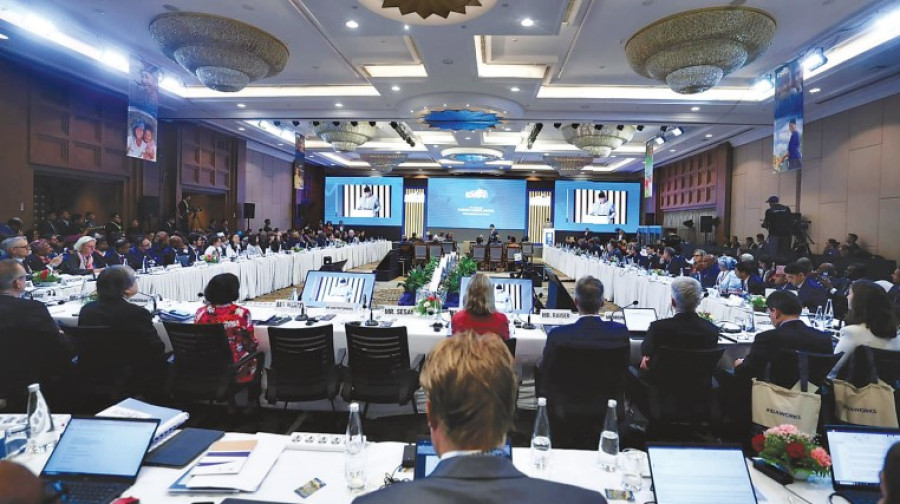Money
Nepal calls for climate justice as IDA21 begins
Prime Minister Dahal urged the global lenders for climate justice and compensation, emphasising the global community’s shared responsibility in addressing the loss and damage incurred due to circumstances that were and are beyond Nepal’s control.
Post Report
Prime Minister Pushpa Kamal Dahal said on Tuesday that despite Nepal’s negligible contribution to global emissions, the country has been disproportionately hit by the adverse effects of climate change.
He urged the global lenders for climate justice and compensation for the loss and damage incurred due to circumstances that were and are beyond Nepal’s control.
“For the least-developed countries like Nepal, debt concessionality [concessional lending] is critical,” said Dahal, speaking at the 21st replenishment meeting of the International Development Association (IDA21).
For the first time in Nepal, the consultative meeting is being held over four days. Replenishing IDA’s resources will be a vital topic of the meeting, which comes at the midpoint of a funding cycle concluding in December 2024—when donors commit to contributions for July 2025 to June 2028.
The third IDA21 meeting in Kathmandu brought together officials from 65 donor governments and representatives of borrowing member countries to discuss the proposed IDA21 policy focus areas—people, planet, prosperity, infrastructure, and digitalisation.
Donors meet every three years to replenish IDA resources and review its policy framework. Officials from the donor governments and representatives of borrowing member countries ensure that IDA’s policy and financing frameworks are responsive to the country's needs and current challenges.
They will also look at financing scenarios—the level of donor contributions required to support these scenarios—and assess the financing needs of countries supported by IDA.
After years of promises of new climate funding, the developing world is coming to grips with a disappointing reality that not enough funding is coming to address the challenges of climate change.
Nepal's diverse geo-climatic system, which combines heavy monsoons, steep terrain, and remoteness, renders the country vulnerable to natural disasters.
According to the National Climate Change Survey 2022, the second of its kind, released by the National Statistics Office recently, the economic losses in both farm and off-farm sectors over the last five years, excluding significant infrastructure damages, amounted to Rs415.44 billion.
Experts say that due to extreme climate behaviour, farmers might lose the basis of their livelihoods, and even those who have escaped poverty may be dragged back into it.
“We are vulnerable to multiple crises. The climate crisis could reverse our hard-won development gains,” said the prime minister.
IDA is the part of the World Bank that invests in the future of people and the planet, with projects across 75 countries. Established in 1960, IDA aims to reduce poverty by providing grants and zero- to low-interest loans for programmes that boost economic growth, reduce inequalities, and improve people’s living conditions.
Dahal said that Nepal has faced significant challenges, including devastating earthquakes, disasters, the Covid pandemic, and economic slowdown, which have caused substantial output losses and hindered the country’s progress towards economic prosperity.
“To ensure sustainable and resilient growth, we are adopting our homegrown Green Resilient Inclusive Development (GRID) approach, prioritising ten key transition sectors and actions to be accomplished over the next decade,” said Dahal, showcasing Nepal's determination to overcome the challenges of climate change.
He said Nepal’s development priority and GRID approach align with the World Bank's evolution roadmap and global challenge programmes.
He said that IDA’s commitment to strengthening country-driven models will empower countries to take ownership of their development agendas, foster inclusive stakeholder engagement, and build robust institutions and systems.
“Realising this fact, we wish to work closely with IDA and other stakeholders to streamline this approach in the IDA21 cycle.”
Nepal has been an active IDA borrower for over six decades.
During this period, IDA has been a significant source of development finance for Nepal and has delivered impact. “With this support, Nepal has achieved significant outcomes in infrastructure building and social development overall,” Dahal said, instilling hope for a brighter future with continued support from IDA.
“We would like to request you to continue the same moving forward. I agree that we have capacity constraints in a new federal context. Project execution performance is slowing, and spending is low,” Dahal said.
“We may need to restructure our policy framework, but policy change cannot occur overnight in a democratic system. That's why you are here to support us with patience to continue our development aspiration to increase the speed and impact of IDA and to build a common hope.”
The prime minister said Nepal's key strengths include its strategic location between two of Asia's largest economies, abundant hydropower resources, thriving tourism and agribusiness sectors, and a young, hardworking population.
Sheku Sambadeen Sesay, the independent co-chair of IDA21 Replenishment, said IDA works similarly across 75 countries worldwide. “If I look at my own country, Sierra Leone, IDA has contributed a lot. The civil war ravaged Sierra Leone from 1991 to 2002 and destroyed the country's infrastructure, including its health systems.
Sesay said that IDA moved in swiftly with the construction work, and today, at least, the country is at a stage where it has the conditions for take-off.
Sesay sees IDA as a complete package as it brings technical assistance and knowledge, builds capacity and affects policy change. IDA contributes as a package, mostly co-financing with countries that can't afford high interest rates.
Axel van Trotsenburg, senior managing director of Development Policy and Partnership at the World Bank, said the next few days would be crucial.
“This forum will help the beneficiary countries embrace very proactive results-oriented programmes. It will be for the donor countries to see how that package could facilitate the maximum generosity when the pledging comes,” Trotsenburg said.
He said it would be up to the bank to see how IDA can do more and contribute even further to a successful outcome.




 24.09°C Kathmandu
24.09°C Kathmandu














